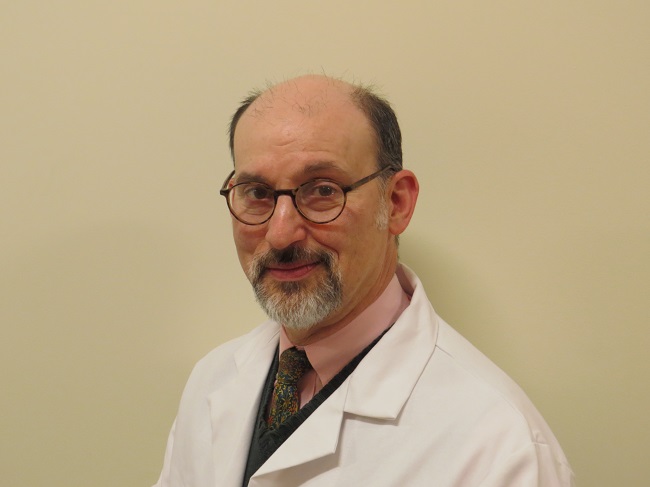Dr. Harlan Rich, a gastroenterologist at the Brown Medicine Endoscopy Center in East Providence, talks about colon cancer, a disease that gained widespread attention last year after it claimed the life of actor Chadwick Boseman.
Due to the COVID-19 pandemic, Rich and his colleagues have seen a drop in the number of colonoscopies performed but are working to spread the word on the importance of the procedure.
PBN: Did you see a drop in the number of patients coming in for routine colonoscopies during the height of the COVID-19 pandemic? If so, are numbers returning to normal?
RICH: Due to the pandemic, we closed the Brown Medicine Endoscopy Center from mid-March to mid-May, thus the total number of colonoscopy procedures has decreased this past year. Statistics show that up to 90% fewer colonoscopies are being performed nationwide as a result of the pandemic, compared with the prior year.
Other screening tests (e.g., for breast cancer) are also not getting done. Our Endoscopy Center has been working diligently with providers and patients and is currently exceeding our pre-COVID monthly case numbers. Vigilant precautions for patient and staff safety are being taken prior to, during and after procedures are performed.
PBN: Colon cancer has been in the spotlight after the recent death of “Black Panther” star Chadwick Boseman at age 43 from the disease. What are some things that younger people should be aware of about colon cancer?
RICH: We have been aware for several years that the epidemiology of colon cancer has been changing; we are seeing younger cohorts of patients affected for reasons that are not totally clear. The age-adjusted incidence in patients under the age of 50 has more than doubled when comparing 2000-2012 with 2012-2017.
The American Cancer Society published a guideline in 2018 that advocated for screening to start at age 45; at the time, the recommendation was not universally accepted. The U.S. Preventative Services Task Force produced a draft guideline in October 2020 with the same recommendations and, if approved, it is likely that this will become standard practice. Unfortunately, starting screening at age 45 would not have benefited either Chadwick Boseman or Jay Monahan, Katie Couric’s husband.
Younger people should be aware that symptoms of colon cancer include blood in the stool, changes in bowel pattern or consistency (constipation or diarrhea), belly pain or cramping, fatigue or other signs or symptoms of anemia, or unintentional weight loss, and they should seek medical attention for these symptoms rather than ignoring them or self-treating. It is also very important to know your family history and seek appropriate and possible earlier screening if there is a family history of colon cancer, a family cancer syndrome, or a personal history of chronic inflammatory bowel disease.
PBN: Roughly how many endoscopies are performed each year at Brown Medicine Endoscopy Center, and what is the age range of patients?
RICH: Now in our second year of operation, we are performing approximately 3,000 procedures per year. Our goal is to eventually double that. The age range of patients is 17 to 92 years old.
PBN: Many people dread endoscopies, colonoscopies and the required daylong preparation. What are some things you tell patients to reassure them?
RICH: Most everything a patient reads in the lay press indicates that the prep is horrible. We need to change that perception because for most patients, it is not. However, it may be the most difficult thing about the entire procedure. We want the actual colonoscopy to be very easy for the patient.
Many colonoscopy preps are easier to tolerate and more palatable than in the past. Patients can do a low residue and/or liquid diet the day before and can also do their prep the night before and early on the morning of the procedure. There is a modest amount of fluid to consume and the prep will send the patient to the bathroom several times with loose or watery stools. Overall, most patients find the preparation quite manageable.
PBN: Are colonoscopies still considered the gold standard for colon cancer detection, or can other noninvasive tests be sufficient for people with lower risk for the disease?
RICH: Colonoscopies are the gold standard screening technique for patients at increased risk for colon cancer. They are one of several screening tests that may be considered in patients at average risk, but colonoscopy offers several advantages.
First, a well-performed colonoscopy in an average-risk person with an excellent preparation need only be performed once every 10 years if no polyps are found. Second, the colonoscopy is a “one-stop” visit, in that polyps usually can be removed, and abnormalities can be sampled (biopsied) during the examination. Several screening techniques, including fecal immunochemical testing and stool DNA or FIT-DNA testing (Cologuard) offer the convenience of a stool-based test but need to be done more frequently (every 1-3 years), and require a colonoscopy for further investigation if positive.
Internationally, some health care systems combine FIT testing with a shorter scope test (a flexible sigmoidoscopy), which is lower cost and does not require sedation, but only evaluates the lower one-third of the bowel.
Elizabeth Graham is a PBN contributing writer.













